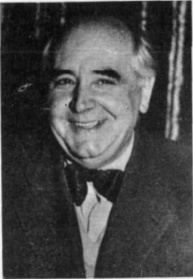Miroslav Krleža
| Miroslav Krleža | |
|---|---|

Miroslav Krleža in 1953
|
|
| Born |
7 July 1893 Zagreb, Kingdom of Croatia-Slavonia, Austro-Hungarian Empire |
| Died | 29 December 1981 (aged 88) Zagreb, SR Croatia, Yugoslavia |
| Occupation | Novelist, playwright, poet, philosopher, essayist, cultural critic |
| Language | Croatian |
| Nationality | Croat |
| Period | 1915–77 |
| Literary movement | Expressionism, Socialist realism |
| Notable works |
Gospoda Glembajevi Hrvatski bog Mars Balade Petrice Kerempuha Povratak Filipa Latinovicza Banket u Blitvi Zastave |
| Spouse | Bela Krleža |
Miroslav Krleža (pronounced [mǐrɔ̝slav̞ kř̩le̞ʒa]; 7 July 1893 – 29 December 1981) was a leading Croatian writer and a prominent figure in cultural life of both Yugoslav states, the Kingdom (1918–1941) and the Socialist Republic (1945 until his death in 1981). A one time Vice President and General Secretary of the Yugoslav Academy of Sciences and Arts (JAZU), he has often been proclaimed the greatest Croatian writer of the 20th century and beyond.
Miroslav Krleža was born in Zagreb. He enrolled in a preparatory military school in Pécs, modern-day Hungary. At that time, Pécs and Zagreb were within the Austro-Hungarian Empire. Subsequently, he attended the Ludoviceum military academy at Budapest. He defected to Serbia but was dismissed as a suspected spy. Upon his return to Croatia, he was demoted in the Austro-Hungarian army and sent as a common soldier to the Eastern front in World War I. In the post-World War I period Krleža established himself both as a major Modernist writer and politically controversial figure in Yugoslavia, a newly created country which encompassed South Slavic lands of the former Habsburg Empire and the kingdoms of Serbia and Montenegro.
Krleža was the driving force behind leftist literary and political reviews Plamen (The Flame) (1919), Književna republika (Literary Republic) (1923–1927), Danas (Today) (1934) and Pečat (Seal) (1939–1940). He was a member of the Communist Party of Yugoslavia from 1918, expelled in 1939 because of his unorthodox views on art, his defense of artistic freedom against Socialist realist doctrine, and his unwillingness to give open support to the Great Purge, after the long polemic now known as "the Conflict on the Literary Left", pursued by Krleža with virtually every important writer in the Kingdom of Yugoslavia, in the period between the two World Wars. The Party commissar sent to mediate between Krleža and other leftist and party journals was Josip Broz Tito.
...
Wikipedia
